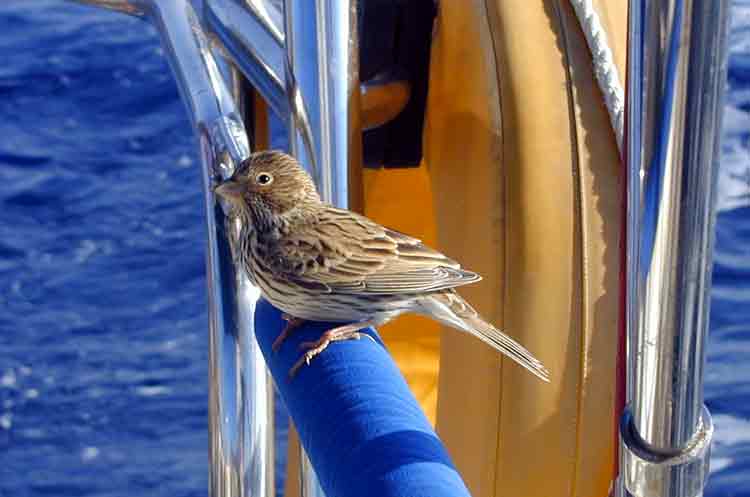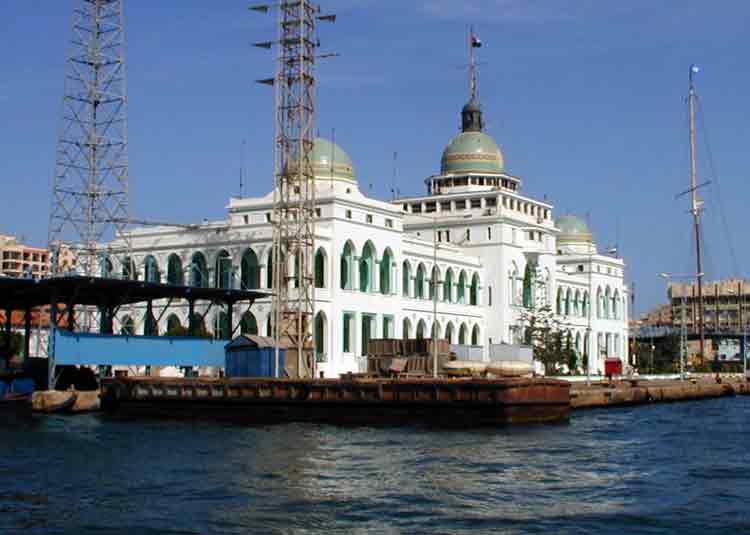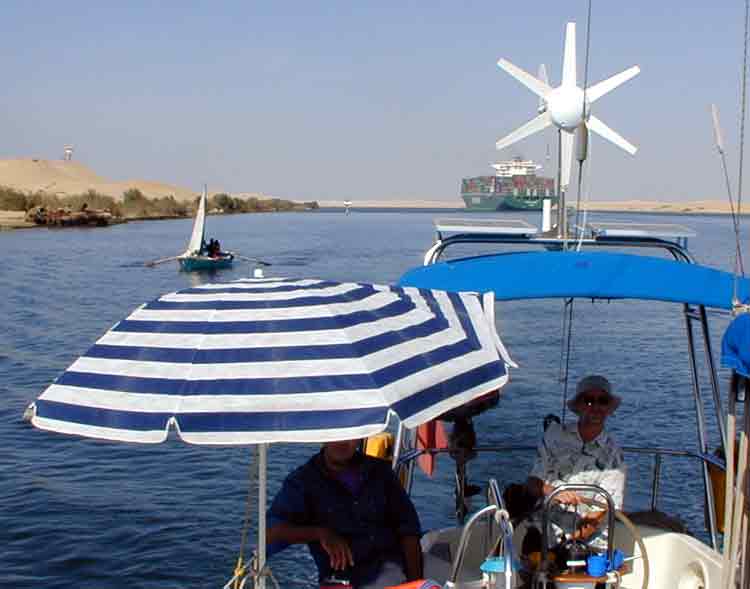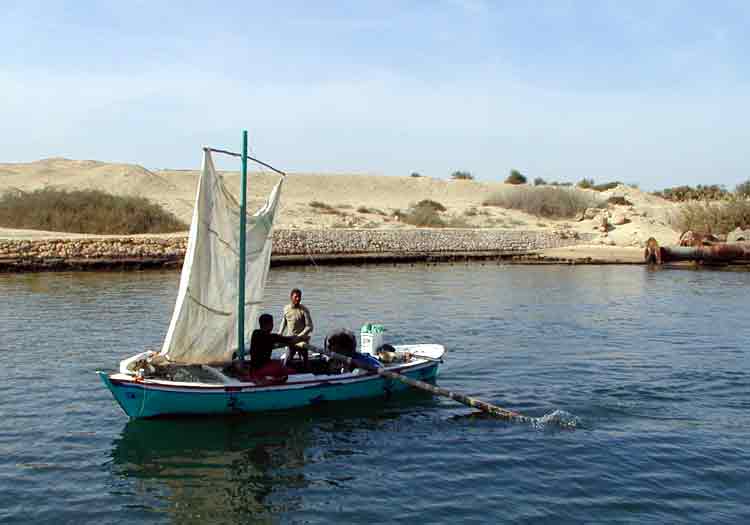The Suez Canal

Mystic of Holyhead (successor to Lynn Rival)
Rachel and Paul Chandler
Thu 1 Nov 2007 16:56
|
29:56.91N 32:34.44E
We left Larnaca just before midnight on 25th October and are now at the southern end of the Suez Canal. Our journey from Cyprus to Port Said, at the north end of the canal, was pretty uneventful, the opposite can be said for our transit through the canal yesterday. We really didn't want to leave Cyprus so hung on until the last minute. All the other rally yachts had left before us, arriving in Port Said last Saturday. Some arrived in the night and had to wait until dawn. They had better winds than expected so made good progress but we didn't get enough wind to sail for a lot of the time and arrived soon after dawn on Sunday, which was as we expected. It was a leisurely 55 hour passage with not a lot to see or do apart from being visited by the occasional migrating bird that wanted a rest. We did break some personal records: we were more than 100 miles away from land at one point, and of course we are now the further south we've ever been in Lynn Rival. The interesting bit of the journey was the approach to Port Said where we had to find our way through the oil and gas fields and across the shipping lanes and anchorages.  Stowaway! On arriving at the entrance to Port Said we were informed by the agent handling the rally business that we must take a pilot on board to bring us the short distance from the outer breakwater into the inner harbour. A little further on a boat arrived and the pilot jumped aboard. It's a tricky manoeuvre as both boats need to maintain speed in order not to knock against one another. The pilot boat captains do not understand the difficulties of manoeuvring in a yacht with only an auxilliary engine, but in the end we got away with only a few marks on our topsides from their fendering. We soon got a taste of what it's like dealing with the canal pilots. The pilot boatmen kept pestering us for baksheesh, hovering close to us for some time, and the pilot when not telling us to go in the wrong direction, kept asking what "present" we were going to give him. Because of the large number, the rally yachts were moored in a different place to the normal place for yachts so we had to insist on following the course we knew was correct. The pilot left after about 10 minutes and demanded 20 US dollars. We gave him some beers and he complained bitterly. As a result, we got the impression that our time in Port Said would be fraught with discourteousness and constant begging for baksheesh.  The Suez Canal Authority building in Port Said We tied up in a relatively pleasant harbour normally used by the Suez Canal Authority for pilot and small tug boats. We had electricity, water, clean toilets and showers available so it was much better than we had expected. The first thing we had to do was to meet the agent handling the rally business and start the bureaucratic process of getting visas, cruising permits and measurement to determine our fee for the Suez canal transit. We had to wait for our visa before we could leave the harbour compound, which was guarded 24 hours a day. However, everyone was very welcoming and we soon realised that the canal pilots' behaviour is the exception rather than rule in Port Said. We hadn't expected Port Said to be such a pleasant and interesting city as it turned out to be. It's quite tatty and dirty by European standards, but the shops, restaurants and cafes are extensive and very cheap. Although it has many characteristics of other arab countries we've been to, it also has a Mediterranean feel to it. It's easy to find your way around as most signs are in English as well as Arabic, and the people are extremely friendly and welcoming. English football league is very popular with the younger men so once they had exhausted their knowledge of English phrases (How are you? What is your name? Where do you live?), the names of the major teams would usually be recited. Arriving back at the harbour after a night out with some of the other rally participants we found much activity on Lynn Rival and our neighbouring yacht. It turned out that a tugboat had come too close to our sterns and caught the anchor lines on their propellor. Fortunately for us our line was easily freed but our neighbour's line was well and truly wrapped around the prop. After some effort by divers to free the prop they had to cut the line and tie it together in a knot. Our neighbour was given a replacement line, but not nylon so not ideal. Another evening we were all taken out to supper by our local agent and the Suez Canal Authority. A bus collected us and we had a police escort across the city. We couldn't work out whether this was overkill or whether there had been a security alert. Earlier in the day one of the yacht crews had been accompanied in their walk around town by an armed guard. None of us could work out why, as the rest of us were wandering around unattended. The meal in the Hotel Albatross was very good and we were entertained by very unusual music and dancing displays. We were joined by various senior people from the agent and SCA, many of whom looked as if they would rather not be there! On Tuesday we learned that our transit of the first half of the canal would be in 3 convoys and the first would start 6am the following morning. We were one of the lucky ones for the early start so we spent the rest of the day preparing. At 7pm we had to go to the Agent's office to pay our bill for all the various bureaucratic stuff, a total of 514 US dollars. That process didn't finish until about 10pm and we'd yet to have supper so we didn't get an early night. We got up at 5am and our pilot arrived before 5.30 yesterday morning. Our anchor was well dug into the mud and rubbish on the bottom so it took us a while to get ready and cleaned up but our convoy was off before 6am. We were 6 boats, led by Lo the rally organiser in Mistral, and we had agreed to motor at 5 knots (the minimum speed for the canal) and stay in a line. Things soon fell apart as some of the pilots wanted to go faster. Our pilot (Allah) was courteous and helpful from the start, and accepted that we could not go faster. It then began to get foggy and we could no longer see all the boats ahead, and then we lost sight of the one immediately ahead. Pilot Allah asked if we had radar, which we don't, and directed us to stay close to the side of the canal and keep a good look out for the regular marker buoys, staying outside the channel. Visibility was between 100 and 150 metres so with one of us on the foredeck and the other at the helm watching the echo sounder and standing by to do an emergency stop we kept up 5 knots. We almost ran into one floating fishing line but managed to avoid hitting anything. We had no idea where the other yachts were, but heard some discussion on the VHF. Most of the others had radar and were being encouraged to maintain over 6 knots and didn't feel safe at that speed. From time to time large ships were passing us in the main channel - a spooky experience. After 3 hours the fog lifted and we were surprised to find that we were close to four of the other yachts. We later found out that the 6th had insisted on anchoring and waiting for the fog to lift. (Also, our pilot told us later that he had been ordered to stop us as we didn't have radar but he negotiated with the controller to allow us to continue.) We were soon left behind again as the others were being encouraged to go faster. Our log was showing 6 knots which seemed to keep our pilot happy but we were actually going slower (according to the GPS readout which we didn't show him) possibly because we had something caught on our prop. The canal is littered with floating weed and other stuff so it's surprising we didn't have more of a problem. The next 3 hours of the trip were uneventful and we kept busy, noting any passing landmarks and chatting to the pilot.  One of the regular control stations Our pilot had to radio in at the signal stations every few miles along the way. We were not sure how much he spoke to the other pilots but seemed to get reports on where the other yachts were. He spoke enough English to communicate reasonably well and was happy to tell us about the various features of the canal, about his family and to teach us some Arabic words. We regularly passed fishermen and we exchanged greetings and waves. Also there are frequent military establishments along the shore and the bored guards would shout greetings and wave to us. The scenery is generally flat, with desert on the Sinai side and occasional oases and towns, mostly on the African side. Soon after noon the 6th yacht that had been anchored in the fog overtook us, and not long before we were expecting to reach our destination, Ismailia, we were in for another surprise. We heard on the radio that the lead yacht had been told they could not enter Ismailia for "security reasons" and must all continue on to Suez, another 8 hours journey through the southern half of the canal! We were very disappointed, not least because Ismailia is supposed to be a pleasant place to visit. We were also not looking forward to another 8 hours motoring, especially as 4 of them would be in the dark. On approaching Ismailia we were some way behind the other yachts in our 'convoy'. A pilot boat came alongside and we said goodbye to our first pilot who, predictably, was not happy with the tip we gave him. Despite being a lovely man he spoiled the memory by whining about the E£50 (about £4.50) tip in what we understand to be the standard Suez canal pilot fashion. Since it was apparently an insult to him we offered to take it back but he decided to hold on to it! We managed to avoid much hassle from the pilot boatmen. We were too busy getting sorted for our extended trip to find them any "presents".  Canal traffic Our second pilot jumped aboard and sat down in the cockpit, pointed us in the direction of the channel that by-passes Ismailia and introduced himself as Sayeed. He wore a white cap and Islamic beard and soon settled down to reading his Koran. We thought he might be a bit serious but we soon found out that he was a delightful man, who was a pleasure to spend time with. His English was limited to those terms he needs to know as a pilot but we soon established a rapport. He was a very competent seaman and after he had spliced up one of our loose ends we showed him our copy of 'Knots, splices and fancy work'. He was fascinated and, although he could not read the text he worked through the pictures and explained to us how his method of splicing wire hawsers differed from the one shown in the book. He stopped regularly to pray, but still maintained his look-out and from time to time gave us hand signals while in full flow!  Sailing is prohibited in the canal! Sayeed wanted us to go faster and as there was a beam wind we told him we'd go faster if we motor-sailed. Sailing in the canal is forbidden ibut Sayeed negotiated with the controller to let us motor sail. At first the wind was not enough to make much difference but once we entered the Great Bitter Lake the wind picked up and we were soon showing 7-8 knots on the speedo, which delighted Sayeed. Little did he know that the GPS was saying only 6-7 knots, though he would have known about the current which was against us. The Great Bitter Lake is a change from the main part of the canal. It seems like a vast expanse of water and at dusk it was littered with fishing boats, many with sails made out of what looked like old fertiliser bags sewn together.  The fishing fleet in the shipping channel, great Bitter Lake, at dusk As there were no large ships around Sayeed directed us down the middle of the shipping lane. The lanes are well marked but as darkness fell the big worry was being able to see the fishing boats and their trailed nets. Apparently the fishing is especially good in the Lakes so the fishermen are prepared to take chances, especially when there are no large ships around. We kitted Sayeed out with a lifejacket and harness and he spent much of the time on the foredeck directing us around the little boats and their nets. We only had one crash stop to avoid a line! As we passed them he would shout to them, presumably telling them off for being in the shipping lanes. He seemed to be having a lot of fun. At the bottom of the Great Bitter Lake we had to take the genoa down because the controller in the signal station there was "no friend" of Sayeed so he didn't try to negotiate with him but as soon as we'd passed we put it up again. By then Sayeed was winching in the Genoa sheet and we were inviting him to join us as crew on the passage to India! By 8 o'clock in the evening we were in the middle of the Little Bitter Lake and the wind dropped so we furled the Genoa but we made good progress as we no longer had a current against us. Soon we were in the final (tidal) section of the canal, which was free from fishing boats and the tide was with us so we made up time. Although we hadn't seen any of the other yachts for some time, we heard on the radio that they were preparing for mooring in Port Tewfig/Suez. Sayeed was on the phone to his family letting them know when to expect him home. By this time Rachel was familiar with the names of his 6 children so the phone was passed to her to have a 'chat' with them! We arrived in Port Tewfig just before 10 o'clock. It's always worrying arriving somewhere strange at night even though we knew there would be help on arrival either from the other yachts already there or from the yacht club staff. Sayeed made sure we came into the anchorage safely and helped us moor up between two buoys. We said our goodbyes and gave him a good tip, for which he was very grateful. Before going to bed we found out that one of the yachts already here had hit an unlit buoy in the dark and had some damage to be repaired. This morning we heard more news but it is still a bit of a mystery why we were not allowed to stop in Ismailia. The second convoy of rally yachts, who left at 10am yesterday were allowed to stop at Ismailia when they reached there yesterday evening. Today's final convoy of rally yachts were due to leave at 6am and rumour has it that some will be stopping at Ismailia and others coming straight to Suez. The rally was due to spend 6 nights in Ismailia and another 6 here. Some of us are hoping to take the bus back to see Ismailia and on Monday we are making a trip to Cairo and the Pyramids but whether we all stay here for 12 days seems unlikely. It's a pleasant enough mooring with the town on one side and a view of the ships entering and leaving the canal on the other. The yacht club staff are very industrious. So far today they have delivered diesel, bread, eggs, fresh fruit and vegetables, and organised our laundry. All at an elevated price of course! |